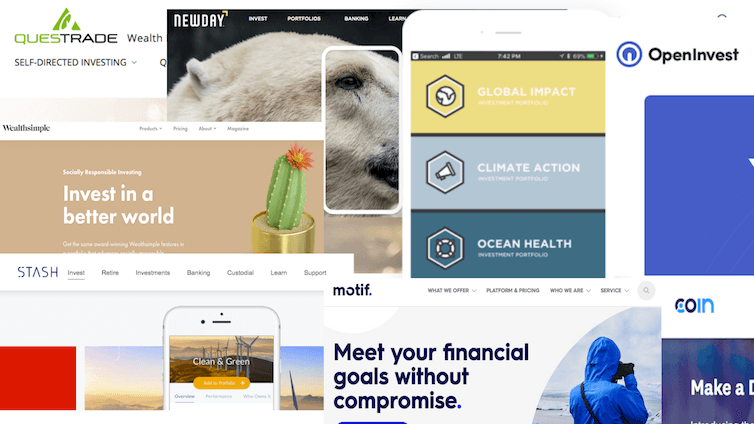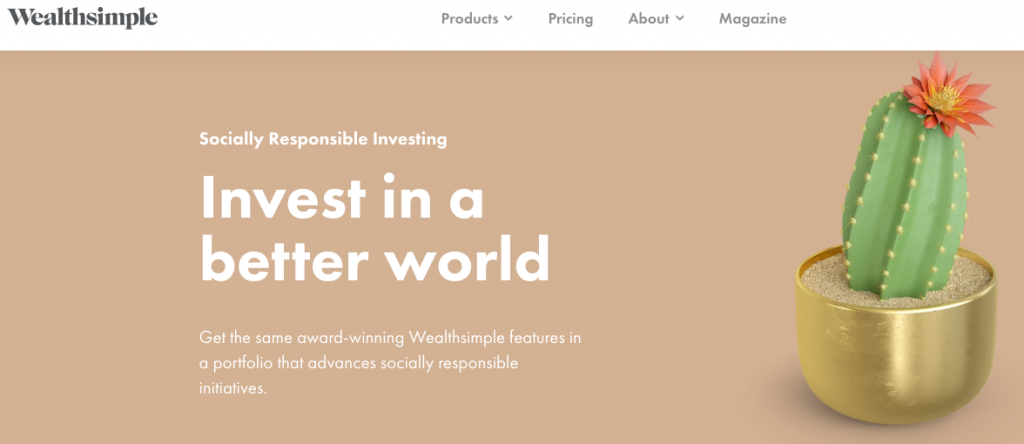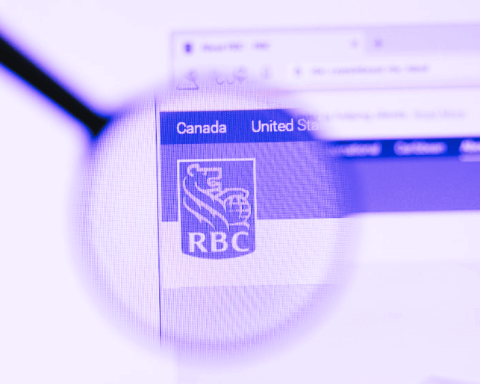Gone are the days when penny pinchers walked into their local banks and signed onto whatever investments their financial advisors recommended. A deluge of young investors is shaking up the investment community, demanding that their hard-earned savings do more than just tick upwards until they retire in Florida.
And since, let’s face it, few of us really have time for or interest in sitting through dull bank meetings to talk mutual funds, low-fee automated robo-advisors are stepping in to deliver feel-good investments you can order up in minutes on your smartphone.
Millennials clearly want this. They see their purchases (from footwear to exchange-traded funds) as powerful drivers for social change. No wonder almost every investment house now offers socially responsible investments (SRIs), which reportedly represent anywhere from 18 to 50% of investments, and slick apps offer funds that promise to clean up our oceans and lower your carbon footprint with cuddly pictures of animals to prove it. But is anyone taking the time to read through their holdings to make sure they’re legit? Turns out not so much.
Corporate Knights examined nine top American and Canadian robo-advisors and investment apps that are promising values-driven investments. Some had genuinely sustainable offerings. Others might make you choke on your fair trade coffee.
Investing in big billion dollar companies is never going to be an exercise in pure virtue and we weren’t looking for that. Using the Corporate Knights database of roughly 6,000 corporations, we scanned for red-flag holdings – companies singled out for really egregious behaviour.
Luckily, there is a data revolution going on with more information than ever available about which companies are on or offside regarding a host of important issues – from plastic pollution and affordable access to medicine to animal welfare and anti-climate lobbying. It would be nice to see more advisors – automated or not – make use of these.
It’s early days for ethical robo-advisors, but there are already a few solid options. Editor’s choice? The best available right now are Swell and OpenInvest, if you’re in the US. For Canadians, well, robo-advisors may not be the best route for you until the companies behind them offer more truly values-driven options.
Our wish list: we’d like the best practices on personalization from Motif’s DIYs and OpenInvest, mixed with OpenInvest’s ability to vote with your shares, topped by the fiscal transparency of Wealthsimple and Swell. Stir in a dozen more sustainable screening tools and we’d be cooking.
In the meantime, here’s our take on nine robo-advisors and apps promising to invest in a better world today.
Wealthsimple
Canada’s largest and highest profile robo-advisor is in the US, too (Did you catch their interview with Margaret Atwood in their February mag?) Wealthsimple offers an “Invest in a Better World” option that pools together outside funds rather than building their own.
Assets under management (AUM): $3 billion CAD
% AUM values-aligned: N/A but they say more than a quarter of their clients have chosen an SRI portfolio.
Minimum investment: $0
Fees: 0.5% of first $100,000 invested
Open to both Canadians and Americans? Yes
★ World-changing impact: Next to no information upfront on the planetary impact of your investments beyond a few brief words describing the five exchange-traded funds that form the foundation of the socially responsible portfolio. Would be nice to see exactly how much carbon their “lower carbon” ETF saves the planet.
★★★★Shows how returns compare to business-as-usual: Helpful graphs spell out how Wealthsimple’s SRI investments have fared on the market compared to “traditional investors” with more details on performance under FAQ.
★ Transparency: Wealthsimple’s FAQ lists the names of the ETFs in its general SRI portfolio (i.e. iShares Low Carbon or iShares Janzi Social Index), but you’ll have to dig offsite to find out what their holdings are.
★Customization: Wealthsimple encourages you to “invest in your values” but if you have a specific moral hankering, like going fossil-free or avoiding weapons manufacturers, you might want to look elsewhere. Any customization is more related to your financial goals than the particulars of your ethics.
Inside line: Wealthsimple was looking into offering custom-designed diversified portfolios composed of specific stocks instead of ETFs, but apparently the Ontario Securities Commission was going to require users to jump through additional hoops in the sign-up process, so Wealthsimple demurred.
★Green cred: Having iShares Low Carbon Target ETF might sound eco, but climate-concerned customers aren’t going to be keen on the fact that some of their coin is going towards climate obstructionists Berkshire Hathaway and Chevron (both rated F for anti-climate lobbying, according to UK-based non-profit Influence Map), as well as pipeline-pusher Kinder Morgan. Not sure how happy many of Wealthsimple’s SRI clients would be knowing they own shares in Imperial Oil and EnCana, too, thanks to iShares Janzi Social Index in the mix.
Newday
This uplifting app invites you to “invest with purpose,” letting you pick from about half a dozen portfolios – Global Impact (in line with UN Sustainable Development Goals), Ocean Health, Climate Action, Animal Welfare, Gender Equality and Fresh Water. Too bad their holdings raise a boatload of red flags
AUM: $1.2 million+
% of AUM values-aligned: According to their marketing, 100%.
Minimum investment: $5
Annual fee: 1% (unless you’re a student, then it’s $1)
Open to both Canadians and Americans? US only
★★World-changing impact: Newday offers more detail on why individual stocks were chosen for each portfolio than most (under Ocean Health holdings, you’ll find out IBM is making robots that clean the oceans and collect data). Still, those descriptions sidestep many issues of concern (see Green Cred).
★★★★ Shows how returns compare to business-as-usual: App users will note that each individual fund comes with a performance graph comparing earnings to date to S&P 500.
★★★★Transparency: You have to download the app to your phone before you can see their complete holdings, but app does make all your holdings easy to peruse.
★★Customization: Pick as many of their impact portfolios as you like, enter your preferred risk level and the algorithm spits out a “diversified portfolio just for you.” No apparent options for dropping or adding companies.
★Green cred: About as greenwashy as it gets. These guys claim to screen out firearm makers but turn around and make weapons-kingpin Boeing a top holding in their Ocean Health fund (23% of Boeing’s $93 billion in sales were from arms in 2017). Ocean Health is also padded with Proctor & Gamble stock – a company which Greenpeace labelled a top 10 contributors to ocean plastic (not sure that’s offset by P&G’s plans to make 320,000 ocean plastic waste-based bottles).
Most misleading of all is Newday’s Animal Welfare fund that claims not to invest in any companies that “partake in animal testing” or factory farming, meanwhile the portfolio is loaded with animal
testing labs and Big Pharma that regularly tests on animals (even if they have “best in practice” standards for that testing). Thankfully, the app seems to indicate it dropped Hormel, an industrial meat manufacturer repeatedly accused of animal cruelty.
Motif
This San Fran-based outfit is sort of like a personal ETF maker. Anyone with a good (or bad) idea can create a motif with up to 30 stocks, and then presto, you can buy or sell that motif for $9.95—a heck of a lot simpler than having to buy or sell 30 individual stocks. There are some questionable holdings in their user generated motif “Impact” options (Sustainable Planet, Fair Labour and Good Corporate Governance).
AUM $116 million+
% AUM values-aligned: N/A
Minimum investment: $250
Annual fees: 0.25%
Open to Canadians and Americans? Yes
★World-changing impact: Doesn’t tell you much other than that you’re investing in companies that either “actively practice sustainability to reduce their carbon footprint,” promote fair wages, safe working conditions, and job security or have “strong ethical track records to ensure accountability, fairness and transparency.”
★ Shows how returns compare to business-as-usual: There’s a graph with “expected” annual returns but no performance-to-date info or comparisons to benchmark.
★★★Transparency: Neat that they tell you which stocks were “removed” and which were added because you selected, say, its Sustainable Planet portfolio, but there are some questionable picks here (see Green Cred). Methodology is front and centre (Sustainable Planet scores are based on MSCI ESG ratings on two key issues: carbon emissions and product carbon footprint.
★★★★★Customization: While there are only three “impact” portfolios, Motif is the only one that lets you “build your own motif” with any 30 stocks or ETFs.
★★Green cred: Not so sure that fracking giant Chesapeake Energy Corporation or oil field services company Baker Hughes deserve to be top holdings in a green portfolio called Sustainable Planet. Clearly, they’re not calculating full life cycle of carbon emissions.
Swell Investing
New and young investors will definitely dig this playful and easy to navigate site, which offers up six themed impact funds loaded with hand-picked stocks related to zero waste, renewable energy, clean water and healthy living. The California-based startup has the backing of its seed investor, Pacific Life.
AUM: $30 million+
% AUM values-aligned: 100%
Minimum investment: $50
Annual fees: 0.75%
Open to both Canadians and Americans? Sadly, US-only
★ ★ ★ World-changing impact: Offers up specs on every company in its portfolios, explaining why, for instance, 4.13% of its Zero Waste Portfolio is invested in the carpet makers at Mohawk and what UN Sustainable Development Goal (SDGs) Mohawk meets.
★★ ★ ★ ★Shows how returns compare to business-as-usual: Great example of how to be upfront about portfolio performance. Swell offers clear graphs on how each themed portfolio compares to S&P 500 (in case you’re wondering, they’re mostly beating benchmark).
★★★★ Transparency: No need to sign in blood before you see what you’re buying. Swell’s complete list of holdings are clearly posted for all to see, with blurbs on why each company was chosen.
★★★★ Customization: Beyond picking from half a dozen themed portfolios, you can actually remove up to three holdings from your portfolios, if you see a name you’d rather not have in there.
★★★★ Green cred: Since the stocks lining their funds are hand-picked rather than outsourced to vaguely sustainable ETFs, you won’t find any hidden Exxons or Lockheed Martins in your portfolio. Though, the fact that Bristol-Myers Squib is among the top-ten holdings in their Disease Eradication Portfolio did raise our eyebrows. The drug company languished in the bottom quartile on the latest Access to Medicine Index, losing points for not having equitable pricing strategies for 80% of its drugs targeting priority countries.
OpenInvest
Cool model out of San Fran founded by alumni of Bridgewater (world’s largest hedge fund) and WWF. These guys position themselves as “Change.org, but with money.” Unlike other online advisors that offer up a limited number of fixed funds, this start-up is unique in tailoring your stock portfolio to be aligned with up a menu of 14 current “causes.”
AUM: Estimated over $50 million
% AUM Values-Aligned: 100%
Open to both Canadians and Americans? For now, US-only. Unless you’re a Canadian institutional investor.
Minimum investment: $100
Annual fees: 0.5%
★★★★ World-changing impact: Maybe the coolest feature of this app is that it encourages you to flex your shareholder activism muscles by getting involved in proxy voting (voting that’s “until now, been blocked by fund managers, red tape, and a pile of paper packets”). FAQ also spells out the power of divestment in reducing demand, lowering share prices, as well as talk of “moral complicity” and changing the conversation.
★Shows how returns compare to business-as-usual: Since their portfolios are highly customized combinations of up to 14 values, we get that it’s not as simple for Openinvest to tell us how their portfolios have performed as it is for Swell and Wealthsimple. However, it would be helpful to know how well their investors have done to date and to fill us in on how much, for instance, divesting from fossil fuels could have pocketed us since inception.
★★★ Transparency: Detailed explanations of the methodology behind each divestment or investment cause. Since there are no set portfolios and tailored stock bundles are based on how many values you click on, it’s hard to get a sense of holdings until you sign up.
★★★★★ Customization: By far the most customizable of the automated SRI advisors. No need to pick and choose one value or another. You can choose divest/invest options from all 14 causes, including divesting from fossil fuels/gun violence/deforestation/carbon pollution/the prison industrial complex, etc. as well as choosing your positive screens, like investing in companies that “Stand Up to Donald Trump,” invest in refugees, are pro-LGBTQ, the list goes on. You can even tweak further by pulling in and out individual companies.
★★★★ Greed cred: Lots of edgy divestment options like “Defund the Dakota Access Pipeline” boosts their activist cred. Though keep in mind that their starting universe is the entire S&P 500 and unless you choose to divest from fossil fuels, you may end up invested in the likes of ExxonMobil. But unlike the competition, they’ll strongly encourage you to get involved in voting in shareholder actions targeting (Monsanto, Disney, Apple have been targets in the past).
Stash
New York-based micro-trading app with over 50 funds, a half dozen of which are tagged under “mission and causes,” including Combat Carbon, Clean & Green, Equality Works, Water the World and Women Who Lead.
AUM: $125 million+
% AUM values-aligned: N/A
Minimum investment: $5
Fees: $1/month. All investment accounts $5k and over only cost 0.25%.
Open to both Canadians and Americans? Americans only.
★ World-changing impacts: Hard to say. Doesn’t tell you much other than some brief marketing speak (“Looking to enlist your dollars in the fight against climate change? Look no further.”
★★ Shows how returns compare to business-as-usual: No handy graphs to tell you how their “mission” funds have done compared to benchmark. Instead, there are hyperlinks to performance indicators on Yahoo Finance, etc.
★★Transparency: Stash only tells you the names of the outside funds it leans on (iShares and Investco, etc) and only a small handful of top holdings are listed. You’ll have to go sniffing around offsite to turn up full portfolio.
★★Customization: Beyond choosing from the six cause-driven ETFs, don’t expect to tweak or customize your impact funds to ditch offensive companies.
★Green cred: No typical ethical investment screens against weapons makers or tobacco here. Dig up the Combat Carbon fund’s full list of holdings and you’ll find all the eyebrow raisers that appear in Wealthsimple (they both use iShares MSCI ACWI Low Carbon Target ETF). That means you can also expect to own some of every top weapons maker (think Halliburton, Lockheed Martin, Boeing) with several controversial companies like Vale (responsible for a massive dam collapse in Brazil).
Coin
John Hancock/Manulife formally launched this “conscious investing” platform this month. They specialize in investing in companies focused on eight impact areas aligned with the UN Sustainable Development Goals.
AUM: N/A
% of AUM values-aligned: 100%
Minimum investment: $50
Annual fee: 0.75%
Open to both Canadians and Americans? US only
Shows how returns compare to business-as-usual: Since they just launched this week, we’ll cut them some slack for not having any info on returns to date.
★★World-changing impacts: Coin tells you lots of very general information on how your impact portfolio of choice invests your money in companies impacting one or more specific UN Global Goal. We’d love some more specifics on how holdings are making this happen.
★★Transparency: Coin talks up its transparency, but is it really necessary to make us fork over our SIN numbers before we get the names of more than five “sample” holding companies? General methodology is spelled out in more detail than some others, though ESG scoring system is proprietary and third-party rating firms aren’t disclosed.
★★★Customization: Coin limits you to picking three of its eight impact areas to create a “custom” portfolio of companies. However, if you really hate a company you can email customer service and request that they blacklist up to three corporations from your portfolio, which is better than most.
★Green cred: Sorry, but since Coin doesn’t divulge more than five “sample” holdings (unless you give out your SIN number), we have no idea how green their investments really are. Though community activists around 3M’s old perfluorinated chemical plant in Minnesota might take issue with 3M being a top holding in Coin’s Clean Water fund (in 2018, 3M settled a lawsuit filed by the state of Minnesota for $850 million after complainants charged that 3M had allowed chemicals to seep into Minnesota’s drinking water for decades). Also not so sure having Pepsi in the Clean Water basket reflects the choice of a new generation, either.
QuestWealth
Toronto-based QuestTrade has recently launched this new robo-advisor with an SRI option focused on three ETFs related to social and corporate governance, low carbon and clean tech.
AUM: QuestTrade has $8 billion AUM but no word on QuestWealth.
% AUM values-aligned: N/A
Minimum investment: $1
Annual fees: 0.25% on first 99,999 investment.
Open to both Canadians and Americans? Canadians only
Shows how returns compare to business-as-usual: QuestWealth was just launched three months ago, so we’ll cut them some slack – for now – for not posting returns to date.
★ World-changing impact: Don’t expect more than a quick one-sentence blurb about stuff like supporting businesses with a smaller carbon footprint.
★ Customization: None, beyond telling them your risk preference.
★Transparency: Pretty murky. QuestWealth offers zero up front info on whether it’s getting its ETFs from iShares or elsewhere and not one company holding is listed. You’ll have to share a bunch of personal info setting up an account before they’ll share all the names of the 10 funds used in their SRI portfolios. Though customer service reps may divulge a couple if you ask.
★Green cred: Tough to gauge when QuestWealth says zip about the companies that line their ETFs. But some snooping reveals their SPDR Low Carbon fund puts your money in all sorts of problematic holdings include climate action obstructionists like Chevron, Berkshire Hathaway and Phillips, as well as red-flagged Vale (behind the recent Brazilian dam collapse) and a sprinkling of coal companies.
ModernAdvisor
This Vancouver-based robo-advisor offers a “socially responsible” portfolio that invests in seven external funds.
AUM: N/A
% of values-aligned AUM: N/A
Minimum investment: $1,000
Annual fees: No fee for clients with accounts less than $10,000. Otherwise between 0.35% and 0.5%
Open to both Canadians and Americans? Canadians only
★★ Shows how returns compare to business-as-usual: Dynamic performance graphs are available online, however, they don’t let you know how they’re doing in relation to benchmark. That info is available upon request.
★World-changing impact: Not much info on your impact besides the fact that you’ll be “doing well by doing good” by investing in companies mindful of Environmental, Social, and Corporate Governance practices. Note: despite what’s advertised on the website, ModernAdvisor tells CK they’ve recently stopped donating 5% of management fees to the Nature Conservancy of Canada.
★★Customization: Not unless you pay. They do offer custom portfolios to clients who have over $150,000, otherwise, there’s a one-time $499 for lower asset clients.
★★★Transparency: Nice that they share detailed blurbs on all seven EFTs in play (including their screens). You’ll have to research offsite to find out ETF fund holdings.
★★Green cred: The good news is ModernAdvisor screens out weapons manufacturers and tobacco makers (unlike many other robos). Helps explain why MA isn’t invested in iShares Low Carbon fund the way Wealthsimple and Stash are. Still, many climate conscious clients aren’t going to dig the presence of Imperial Oil, BP, Phillips and others in its funds.
















